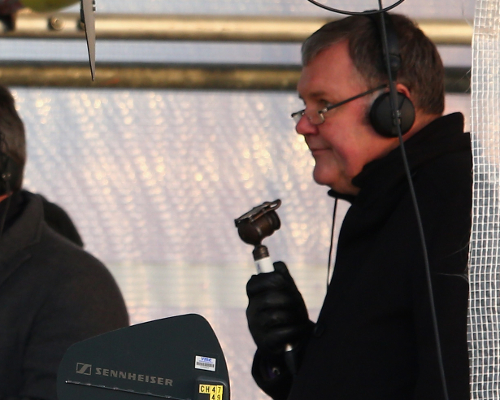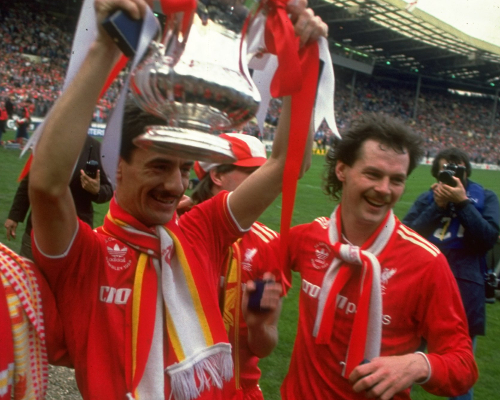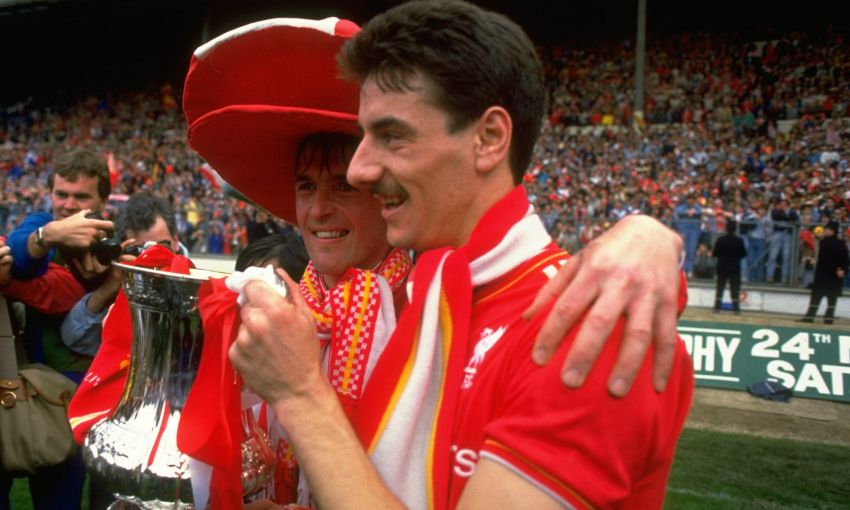'Molby and Rush combination was something special'
As we look back on 30 years since Kenny Dalglish guided Liverpool to a unique league and FA Cup double we catch up with the man behind the microphone who painted the picture of the triumph to listeners in the city.
Clive Tyldesley is preparing to head out to Euro 2016 to cover the tournament for ITV sport, but back in the 1980s he was Radio City’s anchor man covering Merseyside football.
Tyldesley provided the narration on a brand new documentary which premiered on LFCTV GO this week - ‘Double Winners ’86 – On The March With Kenny’s Army’ which tells the story of that unforgettable season.
We caught up with ITV’s main football commentator to reminisce on a special time for the red half of Merseyside.
Clive, a good way to start is the appointment of Kenny Dalglish as the club’s first ever player-manager. What do you remember about this big decision at the time?
I knew Kenny reasonably well at the time, or I thought I did. I think the people who felt they knew him didn’t really know the depth of the man. That was to become apparent probably more so with the incredible help he gave the families after Hillsborough. In the wake of Heysel it was difficult for everybody at the club, particularly for Joe Fagan who had already made his mind up his time as manager as Liverpool had come to an end. It’s easy to look back now and say that was the Liverpool way of doing things to appoint from within, because I think Bob Paisley was a surprise appointment when they decided to follow Bill Shankly with him. It hasn’t always worked out smoothly as it never quite worked out for Roy Evans and it certainly did not work with Graeme Souness. Dalglish was still at the top of his game and he was still a relatively young man in footballing terms and probably not someone any of us had really seen in management terms. His ability to be hard headed and cold in his decision-taking when he had to be and yet the same warm man who held the club together in the wake of Hillsborough – all of those things would come out in the years that followed. I did think at the time it was a very bold and surprising appointment.
Everybody remembers the first Merseyside derby of the season when Liverpool won 3-2 at Goodison Park. How big a statement of intent was that from Dalglish’s new-look team?
Every Merseyside derby is important. At that time they were important nationally, almost internationally. They were title deciding games, FA Cup deciding games of huge importance. I think everything that was happening in the first few months of the new season was shadowed by what was happening at Old Trafford. Manchester United made an extraordinary start to the season and it did seem with Big Ron Atkinson's hands on the reigns this was the dawning of a golden age United fans had been waiting for since the late 1960s. It did seem to be happening and with the same kind of swagger, and if you think back to Sir Alex Ferguson’s comments when he took over at Manchester United and his ambitions to overtake Liverpool, this is what Manchester United thought they were doing then. Of course in the end Liverpool’s success was achieved at Everton’s expense but also - even more dramatically - at Manchester United’s expense as they fell from grace as the season continued. This first Merseyside derby of the season at Goodison Park was in its way the most least significant of the time but looking back now in hindsight this was to be the narrative for the months ahead.

A lot of people didn’t see these opening fixtures because of the television strike and only memories remain of certain games. Because of this did you realise the extra importance of your job and Radio City to paint pictures for supporters listening to the coverage on the radio?
It is an era which is almost difficult to remember how little football there was on television anyway. When there was this dispute between the Football League and the TV companies there was a blackout for half of the season. No football on television is incredible really. Another aspect is the attendances at Anfield were remarkably low for certain games. In a Milk Cup tie against Brighton there was only 15,291 present at Anfield. I’m not quite sure why this was, whether it was a hangover from Heysel or just a sign of the times with supporters not being able to afford to go to the match. The backdrop was very different to football today and the television blackout was denying football its energy supplier because clearly there was a downturn in interest in the game, maybe because of the loss of European football. Radio City and Radio Merseyside are still a very important part of the community on Merseyside along with the Liverpool Echo. It was a privilege to be a part of it all.
Players like Ian Rush, Alan Hansen and Dalglish himself stand out as key performers from the campaign, but what about people like Kevin MacDonald and Paul Walsh whose contributions to the success shouldn’t be underestimated…
They were two outsiders in some senses. Kevin Mac played in the FA Cup and was in the team until the start of the following season until an horrific leg break against Southampton at the Dell. I was at the Dell that day and I remember the stories from the little old first aid hut down in the corner of the ground. It was an awful fracture and such a cruel blow because he could have continued to be a significant player at Liverpool for some years to come. There were foreigners in the team like Jan Molby but a foreigner in those days was a Cockney like Walsh. It was unusual for a chirpy Cockney voice to be heard in the dressing room. Liverpool used to make a habit of players who had done well against them in the past, Michael Robinson is a good example of that. Walshy had always done well against Liverpool, but I remember him being in that double team until he got injured against Manchester United before King Kenny’s return. He had the football intelligence, that streetwise football intelligence and ability to lend that little bit of extra craft to the Liverpool team. When he got a good run and his confidence was high, because he was a confidence player, he could go on a good goalscoring run. This was also Steve Nicol’s big break season in many ways, it was certainly Jim Beglin’s big breakthrough. Steve McMahon joined the club that season so it was also a time of great transition for the club as well as the great success.

You mentioned Molby, the adopted Danish Scouser. Just how big a contribution did he make that season?
His combination with Ian Rush was something special. If you look back to the FA Cup final, that was a game that was getting away from Liverpool until they got their act together. People talk a lot about the Dalglish and Rush partnership and Ian was a raw talent even then – incredibly quick and incredibly instinctive. He needed truly intelligent players with him to make the most of that raw ability and Kenny is clearly one of those, and Jan had a real intelligence and finesse in his game. Sometimes opposites attract. Ian could run about eight times quicker than Jan but he knew that and he could make the ball move quickly to the right areas. He knew what Ian was capable of and the times Jan would pick him out during those crucial game changing moments was one of the most important factors in Liverpool’s success.
What was the turning point for Liverpool that season for you? Everton manager Howard Kendall at the time said it was the return of Dalglish to the starting line-up that changed Liverpool’s fortunes…
You could argue the turning point was the night Liverpool won at Leicester on the same evening that Everton lost late-on at Oxford United. You could argue the turning point in the FA Cup final was the argument between Bruce Grobbelaar and Jim Beglin, because even though Liverpool finished the season as strongly as they did they were making up ground. It was only because Everton didn’t win at Oxford and the fact they didn’t make the most of their 1-0 lead in the FA Cup final that it became a Liverpool double season. Let’s not kid ourselves it was that close and the margin between the two teams was wafer thin. Liverpool’s last defeat of the season was at Everton’s hands at Anfield at the end of February. It was such a complete and moralising defeat the way that it happened and it seemed to be the beginning of the end of the season for Liverpool. But, in typical Liverpool fashion they found a way and won their next game at Tottenham Hotspur which was a difficult away fixture in those days. They started a run and suddenly it started to happen for Liverpool. Sometimes the start of a glorious run is the most difficult part to initiate and Kenny joined in and became a part of that by selecting himself. He was a talismanic man who was big enough for the big occasions and clearly that was very important. In many ways it’s how Liverpool responded to setbacks that made the club great in the 1970s and 1980s. The home team dressing room after the defeat by Everton is probably where the season turned, Ronnie Moran’s reaction alone.
The culmination of the season was winning the title at Stamford Bridge and then the FA Cup final – the second all-Merseyside cup final you covered at Wembley…
There are two elements to a double. I was at Oxford the night Everton didn’t win with two games to go. Gary Lineker had a bundle of chances and I can’t remember why but they kicked off a lot earlier than Liverpool’s game at Leicester City. That was the night where Everton’s title challenge went wrong and meant Liverpool needed to win at Chelsea. I was lucky enough to be at Stamford Bridge. It was a close game and still a pretty rugged place to go and play football in the Chelsea stadium bowl. Kenny scored a wonderful goal and the image of him sitting there celebrating in the dressing room lives with you. I then remember that very odd night at Anfield a few days later when they received the title before they had to play Norwich City in the Screen Sport Super Cup semi-final second leg. This was three days after winning at Stamford Bridge and four days before the FA Cup final. I’m looking at my notes from the time and it was incredible that Grobbelaar, Beglin, Lawrenson, Nicol, MacDonald, Ronnie Whelan and Craig Johnston all started that night. Today that game would be populated by a much younger team. The 1984 Milk Cup final was a strange occasion really because the match wasn’t much but the occasion and the singing of ‘Merseyside’ together was a really big statement for the city to travel together to Wembley. The 1986 final was different. It really was the ultimate derby. Everton had to win it because they had blown the title and they did find themselves in a dominant position. They went 1-0 up and Liverpool were in disarray arguing amongst themselves and then Molby and Rush turned the final around. Once the tide turns, once the momentum switches, you can be a really good side and Everton were a really good side, but you just feel it slipping through your fingers and running away from it. One of my old mates Gary Stevens got a lot of the blame for Liverpool’s equaliser and Liverpool then put the game beyond Everton. The double was such a big deal back in 1986 and it was almost like winning the Champions League today. Liverpool had never achieved a double before and the FA Cup final was the biggest event in our country and it was watched by millions of people from mid-morning onwards. To be there in person and witness it was truly special.
I have an omission to make and I have great friends in both camps. I knew the players really well in both camps. I used to go to a nightclub in Birkenhead when I lived in Wirral which was owned by a friend of Peter Stringfellow. Now Stringfellows was a proper restaurant and club back then and it was the only place in London to go at the time. This guy had asked me on behalf of Peter to get the winning team to bring the FA Cup to Stringfellows on Saturday night and they would have an open invitation. I did sort it before I left Wembley that day, and I felt so bad sorting it in front of three or four of the Everton players as they stood in the tunnel, that I went to the Everton banquet that night. Liverpool took the FA Cup to Stringfellows that night and celebrated in THE night spot in the whole of western Europe at the time.
A new feature-length documentary celebrating Liverpool’s clinching of the coveted league and FA Cup double is available on LFCTV GO now.
‘Double Winners ’86 – On The March With Kenny’s Army’ relives an unforgettable season and features the likes of Hansen, Dalglish, Molby and more.
Narrated by ITV Football's Clive Tyldesley, the 86-minute film can be seen by subscribers now. Click here to find out more about how to subscribe to LFCTV GO.



